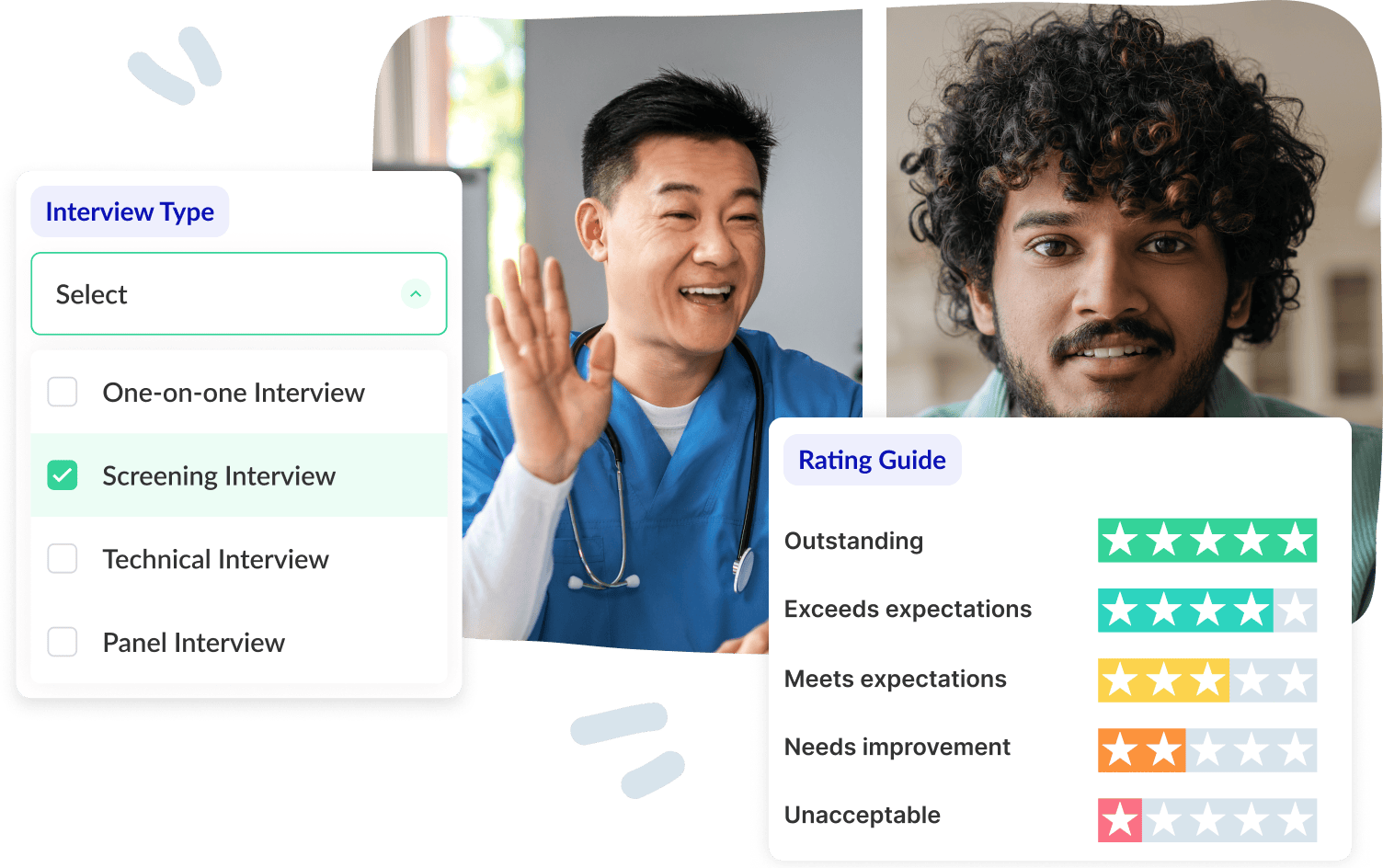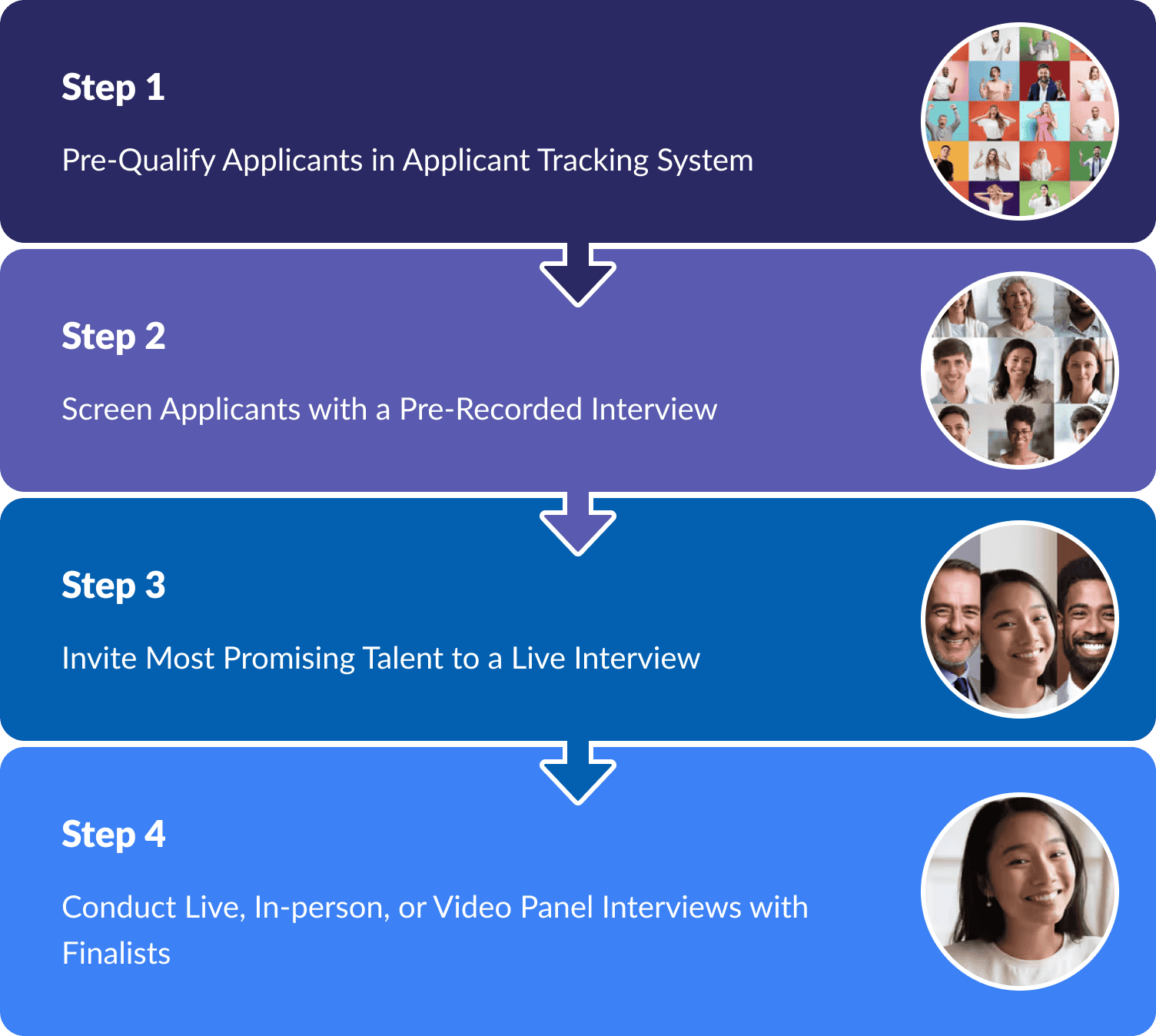
How To Schedule Interviews
Simplify the process to create a great candidate experience for both the hiring team and candidates. Learn how.

Video interviewing software has become one of the most popular recruitment tools and is used to conduct millions of interviews worldwide. These platforms offer convenient, fast, and affordable ways for hiring teams to find the best candidates for any position, and they make it easier for job seekers, too. Given the benefits to recruiters and candidates alike, it's clear why video interviewing platforms are replacing outdated, time-consuming processes such as phone interviews.
Are you a candidate looking to ace your interview?
Read our video interview tips.
While video interviewing has become wildly popular in recent years, believe it or not, the concept has been around for decades. HireVue and Montage entered the market in the early 2000s with the first pre-recorded video interviewing services, allowing people to record at home while hiring managers were doing something else. VidCruiter followed soon after.
Since then, these and other video interview platforms have advanced significantly, going beyond simply providing virtual interviewing capabilities to offering comprehensive video recruiting software that includes built-in tools for automated scheduling, group and panel interviews, rating guides, and more.
Recent innovations include the addition of artificial intelligence (AI) to help recruiters and hiring managers access candidates and make more accurate predictions with data-driven insights.
There are two main types of video interviews: pre-recorded and live video interviews. The main difference is whether the job applicant meets with an interviewer in real time. Advanced video interviewing solutions offer both options.

Pre-recorded interviews, also known as asynchronous, one-way, or on-demand, let candidates answer questions at their convenience. Raters then review and score these responses on their time.
Questions are posed to the applicants in written or video formats. Applicants receive the question, have a predetermined amount of time to think, and then record their response.
The video interviewing platform should allow hiring companies to set several variables, including prep time, number of questions, response duration, and the ability for applicants to re-record answers.

Benefits for Hiring Teams
Benefits for Candidates
PRE-RECORDED INTERVIEWS
Fair and Flexible Screening Software
Faster and More Accurate. VidCruiter's Pre-Recorded Interviewing Offers:
Streamline your hiring and enhance candidate experience.
Live video interviews are similar to virtual meetings, like Zoom or FaceTime, but take place in an environment built for recruiting.
Video interviewing software takes virtual conferencing platforms to the next level with standardized questions and rating guides embedded in the interviewing window. This allows hiring teams to rate candidates’ answers in real-time and focus more on the candidates.
Automated scheduling tools easily connect employers with job applicants at a mutually convenient time for virtual face-to-face interviews. This opens the door to remote, worldwide recruitment without leaving the office and makes group and panel interviews easy.

Hiring Team Benefits
Candidate Benefits
LIVE VIDEO INTERVIEWS
Engage and Evaluate in Real Time
Elevate your hiring with VidCruiter's Live Video Interviewing Platform:
The premium interview experience for interviewers and candidates.
Pre-recorded and live online interviews each have unique benefits, and many top recruiting organizations use both. Together, they form a powerful recruitment tool, allowing your team to interview more candidates, more accurately, and in less time.
Based on our experience organizing thousands of hiring processes, a common approach is this:

86% of global organizations are already conducting virtual interviews according to Gartner.
93% of global desk workers say they want more flexibility in their work situation according to LinkedIn. Why should interviewing be any different?
Adding a structured digital interviewing methodology eliminates guesswork and ensures fair evaluation of all applicants. Standardizing the process makes interviews more accessible and can allow for necessary accommodations to ensure equal consideration. Modern video recruiting software includes these capabilities. Learn more about how an asynchronous platform can promote accessible interviewing.
Video recruiting platform features like question guides, rating rubrics, and interviewer coaching reduce hiring bias and help evaluate candidates more accurately. Structured interviewing can increase the predictive validity of hires by up to 65%. (The Structured Employment Interview: Narrative and Quantitative Review of the Research Literature).
Ideally, AI can make a great assistant to your hiring process— but not necessarily as a primary evaluator. AI-led processes are not universally accepted as ethical and are even illegal in some jurisdictions. AI assessments, facial analysis, and voice-to-text software can be prone to inaccuracy, introducing unnecessary risks, raising privacy and human rights concerns, and potentially increasing hiring bias.
Instead, use AI as an assistant to make the process easier, more efficient, and more consistent for human raters. Let real human beings evaluate all applicants, using their sound judgment and experience. Paired with time-saving automation and structured interviewing, this method is much safer than relying on AI alone. Keep the human in human resources when making important decisions such as hiring.
Sean Fahey discusses how to get the best interview results
On The RecruitingDaily Podcast, Sean Fahey and William Tincup discuss how structured interviewing delivers accurate, dependable results today. For those who don’t want to wait for AI to catch up.
There are endless online interview platform options out there. To find the best fit, consider these perspectives.

Select a video recruiting software that integrates and adapts to your systems, so you don’t have to change your process to accommodate software. Here’s what to ask:
Integration: Does it integrate with your existing systems like calendars, ATS, and payroll?
Security: What about security features like end-to-end encryption and secure data storage?
Flexibility: Can it create customizable, scalable workflows to match your hiring processes and create a branded environment?
Implementation: Is there a dedicated implementation team to plan, optimize, and train your team?
Interoperability: Does it comply with privacy, data protection, and hiring regulations in the jurisdictions you operate?
Choose video recruitment software that supports both your hiring team and job seekers with the following features:
Ease of Use: Ensure the platform is user-friendly for both candidates and recruiters.
Support & Training: Provide comprehensive support and training for your hiring team.
Collaboration: Opt for features that facilitate team collaboration.
Candidate Experience: Focus on delivering a pleasant and engaging candidate experience.
Multilingual Capability: Choose software that supports multiple languages to accommodate every region you operate in.
Live Agent Support: Offer live agent support for your recruiters and applicants to address any technical difficulties immediately.
#1 FOR VIDEO INTERVIEW SOFTWARE
We Know Interviews
Hire great people—in less time and with fewer resources.
Video interviewing software is the backbone of your interview program. The best platforms integrate with other recruiting tools to create a seamless, automated process. Video interviewing platforms allow hiring teams to meet potential employees anytime, anywhere via pre-recorded or live video interviews. Recruiters can conduct and review interview evaluations at their convenience, ensuring a flexible and efficient hiring process.
There are two main options: pre-recorded (asynchronous) and live (real-time) interviews. Both should be treated with the same seriousness as traditional in-person interviews, although they are conducted virtually or as a hybrid interview.
In pre-recorded interviews, applicants record responses to questions without needing to schedule a meeting time.
In live video interviews, hiring teams meet applicants face-to-face online at a convenient time.
Both types have their place, depending on recruitment objectives and the stage of the hiring process.
No, not all asynchronous interviews use AI. Some asynchronous video interview platforms use AI to help analyze responses and provide interview insights. Others simply record applicants' responses to the interview questions, and human reviewers evaluate the recordings without AI assistance. The use of AI depends on the specific platform, the features it offers, and the hiring team's preferences.
Pre-recorded video interviews offer flexibility for recruiters and candidates, allowing them to complete tasks at their convenience. This format ensures consistency and fairness by standardizing questions and removing geographical barriers, widening the applicant pool. It reduces stress for candidates by allowing them to interview at home, enhances accessibility, and makes the hiring process more efficient and inclusive.
Modernize your hiring process with expert insights and advice.